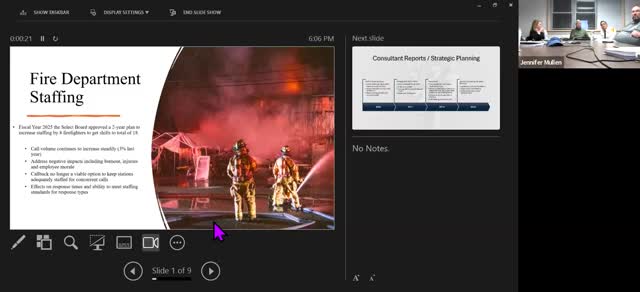Yarmouth fire chief asks finance committee to back override to add firefighters, restructure command
Get AI-powered insights, summaries, and transcripts
Subscribe
Summary
At a Jan. 29 Finance Committee meeting, the Yarmouth fire chief asked the committee to support an override to fund four additional firefighters (phase two of a plan to reach 18 per shift) and to add command and training positions, citing rising call volume, longer ambulance out-of-service times and pressure on the ambulance fund.
YARMOUTH, Mass. — The Yarmouth Fire Chief told the Finance Committee on Jan. 29 that the department needs four more firefighters and changes to its command structure to keep up with a steady rise in emergency calls and growing operational strain.
The chief said the request is Phase 2 of a fiscal 2025 plan the Select Board previously approved and would move the department toward a recommended staffing level of 18 firefighters per shift. "The ambulance generates a revenue close to $2,800,000 per year," the chief said, and the town has been using that revenue to offset wages: "Right now, as of last year, there's $2,000,000 coming out of the ambulance fund every year." He warned that drawing that amount reduces money available for vehicle and equipment replacement.
Why this matters: Finance Committee members pressed the chief on recruitment, overtime, training and how ambulance transports and hospital delays reduce unit availability. The chief said the department averages about 22 calls a day and that only 25% of incidents occur in isolation —multiple concurrent calls are now the norm. He added that an average out‑of‑service time for an ambulance after a hospital call is about an hour: "Minimum, it's an hour before that ambulance gets back into service." Those factors, he said, leave fewer crews available locally and increase reliance on mutual aid.
The chief reviewed the department's history of outside studies and previous staffing changes, including a 2002 consultant recommendation and a 2011 strategic plan that recommended an 18-per-shift target. He summarized recent staffing history: the department was at 14 per shift in 2012, rose to 15 in 2019 (partly with a SAFER federal grant), reached 16 in 2024 and moved to 17 per shift in 2025; the current request aims to reach 18 per shift.
Operational priorities and proposed positions: The chief proposed hiring an assistant chief and a deputy chief (adding command depth) and separating the EMS officer and training officer roles so one person could focus solely on EMS and a second person could manage the training and emergency preparedness program. The chief said the department has nearly 80 EMTs and paramedics who require recurring training (paramedics roughly 60 hours annually; EMTs roughly 40 hours) and that consolidating training under a dedicated deputy would improve standardization and compliance with NFPA guidance.
Financial strategy and constraints: The chief described how ambulance receipts have historically been used to offset wage costs and to pay for apparatus, but rising vehicle costs and steady draws from the ambulance fund have pushed some replacements toward borrowing. He noted reimbursement limits for Medicare patients and said the payor mix reduces per‑call revenue compared with wealthier towns with more private insurance: when Medicare is the primary payer, collections per run can fall to roughly $400–$500 versus over $2,000 where supplemental insurance covers the balance.
Committee members asked about recruitment and retention; the chief said recruiting remains difficult despite pay increases and retention measures and that the department is negotiating in collective bargaining. The chief and committee discussed a proposed retention bonus; the chief said negotiations with Human Resources and the bargaining unit are ongoing and that the department is seeking options similar to other Cape departments that have offered signing or retention incentives.
Facilities and equipment: The chief reiterated findings from a recent facilities condition assessment that both the Main Street station (original building dating to the 1940s) and Yarmouth Port station are functionally deficient — lacking meeting space, ADA compliance and adequate equipment bays. He said prior analyses show existing station locations give acceptable response coverage but that aging buildings and cramped facilities complicate staffing and storage.
Community health initiatives: The chief said freeing the EMS/training officer from administrative duties would allow expansion of community paramedicine and managed integrated health work, including outreach to frequent users and to senior-living facilities (roughly one-third of calls, the department reported). He said the program could reduce repeat transports by connecting residents to community and VNA resources.
What happens next: Finance Director Jennifer (last name not specified in the transcript) said the salaries tied to the request will be presented as a separate override article so the operating budget stands alone. "What I'll do is I'll take it out of the budget, the salary portion, and we'll put it in a separate..." she said during the meeting, explaining the presentation and warrant strategy.
No formal vote on the override was taken at the meeting. Committee members confirmed they will consider the separate override article as it moves through the Select Board and the Finance Committee process. The chief noted the request also depends on collective bargaining outcomes and on whether future call volume trends continue to rise.
Ending: The chief closed by thanking the committee, and the meeting moved to provisional votes on department budgets that the committee considered later in the session.
